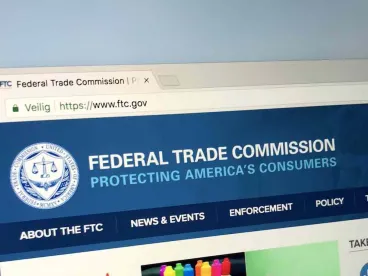On January 5, the Federal Trade Commission (FTC) promulgated a proposed rule that would effectively ban all non-competes with employees and other workers (Proposed Rule). If adopted in its current form, the Proposed Rule would result in a substantial change in the way that employers and investors utilize restrictive covenants with corresponding impacts in a number of areas, including compensation structure, protection of confidential information, merger and acquisition dynamics, and deal valuation.
The Proposed Rule
As drafted, the Proposed Rule would eliminate nearly all post-employment non-compete restrictions. Key features of the Proposed Rule include:
-
Non-Compete Definition. The Proposed Rule defines non-compete clauses broadly to include any contractual term between an employer and a worker "that prevents the worker from seeking or accepting employment with a person, or operating a business, after the conclusion of the worker's employment with the employer."
-
General Applicability. The Proposed Rule treats all workers the same and specifically does not distinguish between low-wage and highly compensated employees or contain exceptions for employees with access to trade secrets or other competitively sensitive information. Notably, the FTC has requested comment on whether different regulatory standards should apply to senior executives or a broader category of highly paid or highly skilled workers.
-
Broad Definition of Worker. The Proposed Rule would apply not just to employees but to all types of workers, including independent contractors, externs, interns, volunteers, apprentices, and sole proprietors who provide a service to a client or customer.
-
Potential Applicability to Other Types of Restrictions. The FTC's commentary to the Proposed Rule indicates that, while other types of agreements, such as customer non-solicitation agreements, confidentiality agreements, and liquidated damages agreements, are not expressly prohibited, such agreements may be considered "de facto non-competes," and thus would be prohibited, if they have "the effect of prohibiting [a] worker from seeking or accepting work with a person or operating a business after the conclusion of the worker's employment with the employer."
-
Limited Sale of Business Exception. The Proposed Rule provides that a "non-compete clause that is entered into by a person who is selling a business entity or otherwise disposing of all of the person's ownership interest in the business entity, or by a person who is selling all or substantially all of a business entity's operating assets" is enforceable only if such person holds at least a 25 percent ownership interest in the business entity at the time the person enters into the non-compete clause. Thus, a founder of a business who is running it on a daily basis and embodies most of its goodwill, but has been diluted to 20 percent equity ownership after successive rounds of financing, cannot be bound to a non-compete when trying to sell the business.
-
Retroactive Effect. The Proposed Rule would require employers to rescind any non-competes entered into prior to the rule's effective date by providing notice via individualized communication to any workers already subject to non-compete restrictions. The Proposed Rule contains model notice language and provides for a safe harbor for employers that provide notice of rescission in accordance with the model.
Context
While the Proposed Rule is consistent with a trend over the last several years in certain states and under the Biden administration of increased government regulation and restriction on the use of non-competes, it goes farther than even the most restrictive states today and its implementation would represent a significant departure from current law in many states.
In recent years, a number of states have taken legislative action to limit the use of restrictive covenant agreements. Recently-enacted state statutes have, for example, imposed minimum salary thresholds for imposition of non-competition and, in some cases, non-solicitation agreements, placed limitations on the maximum duration of a non-competition or non-solicitation restriction, required notice and/or a specified minimum period for an individual to consider non-competition or non-solicitation restrictions before signing, and/or required certain payments or other consideration either when the agreement is signed or during the post-termination restricted period.
The federal government, especially under the Biden administration, has also signaled a commitment to limiting the use of non-competition restrictions. In his Executive Order on Promoting Competition in the American Economy, promulgated on July 9, 2021, President Biden espoused a "whole-of-government approach . . . to address overconcentration, monopolization, and unfair competition" and specifically called on the FTC to consider "exercis[ing] the FTC's statutory rulemaking authority . . . to curtail the unfair use of non-compete clauses and other clauses or agreements that may unfairly limit worker mobility."
In advance of promulgating the Proposed Rule, the FTC has used its enforcement powers to challenge restrictive covenants under federal antitrust laws. The FTC took the position that such agreement was "unreasonable because it bears no relation to [the buyer's] acquisition of 60 retail fuel locations from [the seller]" and that "[t]here is no reasonable procompetitive justification for why the noncompete agreement was necessary for the approximately 190 locations that had no relation to the Acquisition." The final order settling the matter required the buyer to narrow the scope of the non-compete so that it applied only to a three-mile radius around the acquired locations and only for three years. The buyer also was prohibited, in connection with any future acquisition, from entering into or enforcing any agreement that restricts the seller from competing at any location other than a designated area around a location acquired from the seller in that transaction.
Notwithstanding this recent trend, many states continue to permit the enforcement of narrowly tailored restrictive covenants, including non-competes, following the termination of an employment or other business relationship, provided that such restrictions protect a legitimate interest and are reasonable (including in scope, duration and geographic area). For example, in Texas, Florida, and New York – the second, third and fourth largest states by population – restrictive covenants are routinely enforced to protect companies' legitimate interests, including safeguarding trade secrets, protecting other competitively sensitive information and preserving goodwill. Currently only three states – California, North Dakota and Oklahoma – expressly ban non-competes and even these allow for broader exceptions, including in sale of business contexts, than might exist if the Proposed Rule were to be implemented in its current form.
Looking Ahead
A 60-day public comment period on the Proposed Rule has begun and will end on March 10. The FTC has specifically requested commentary on various alternatives to the Proposed Rule, including a rule that would distinguish among different types of workers based on job duties and/or compensation levels (as discussed above) and/or a rule that would establish only a rebuttable presumption of unlawfulness for some or all workers (versus a categorical ban as in the Proposed Rule). Following the public comment period, it is expected that the FTC will publish a final rule which would take effect 180 days after publication. Legal challenges are expected once a final rule is published, particularly if the final rule significantly resembles the Proposed Rule.
The Bottom Line
If a final rule takes effect and significantly resembles the Proposed Rule, many companies will be required to change their practices and procedures around protecting trade secrets and other competitively sensitive information. At this stage, there remains a great deal of uncertainty regarding when a final rule will take effect and how broadly it will apply.
Bonita Stone, Mitchel Pahl, and Kate Saracene also contributed to this article.









 />i
/>i

